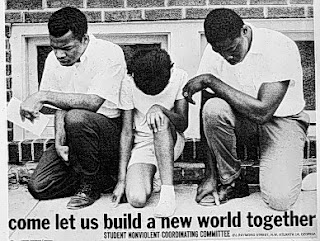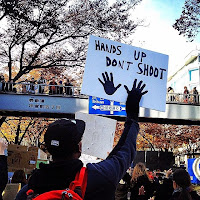The most legitimate critic I have seen thus far is one of my favorite organizations called Race Forward. They are an incredible organization that also publishes one of my favorite magazines, Colorlines. The director of Race Forward, Rinku Sen, penned an open letter to both Starbucks and USA Today to partner with them in a different way.
While I am here for Rinku Sen and Race Forward every day of the week and every day of the year I find that I am still happy with what Starbucks and USA Today are doing. I understand when Rinku Sen says:
"But just any old conversation won’t do. A conversation that leads to something other than frustration requires preparation, a systems analysis, and potential solutions that reach beyond changing individual mindsets or behavior. We have to address the rules that govern our institutions and shape our lives -- many of which appear to be race-neutral in their intention, but are far from neutral in their impact."
The thing is, I completely agree with her. However, what about the folks that don't have these tools yet, but they want to get involved somehow? If we want to get people involved that don't study and follow these things regularly then Howard Schultz and Larry Kramer have created a place to start. This excerpt from their letter shows me that they are not trying to create any systemic change, but they are trying to at least give us all a space to listen to each other and to understand.
"For all our country’s progress, barriers to social justice and economic equality exist in far too many corners. RACE TOGETHER is not a solution, but it is an opportunity to begin to re-examine how we can create a more empathetic and inclusive society — one conversation at a time."
However, I also hear this:
Starbucks staff in my neighborhood have already spent years doing Nobel-level work on being patient with white people. #racetogether
— jay smooth (@jsmooth995) March 17, 2015I am not naive enough to believe that this will end things. I can give you a full list of systemic issues that I believe need to be addressed and discussed everyday. It makes it hard for me to breathe with how much systemic change I feel we need, but I also see the value in letting people open up and talk about stuff.
This initiative also hasn't popped up out of the blue either. Howard Schultz held forums internally across the country to discuss how people were feeling about the movement that was happening, what their everyday experiences have been, and what they feel needs to change. He essentially let people speak and be heard. And I believe firmly that all people just want to feel validated and heard. So, if people are willing, why wouldn't we give this a shot? Maybe this initiative will create more social justice advocates or at the very least create some understanding.
For those of you that know me well, I don't tend to agree with Fox News often, but a piece penned by Juan Williams is also speaking to me when he says:
"No one knows when they might hear an eye-opening insight; hear a compelling thought or an inspiring story. But the cynical pose closes the door to those moments."
We can make the jokes and create our witty tweets, but afterwards let's sit down and chat. Almost everything I have learned in my life has came from me listening to someone else and what they think.
Here is one of my personal favorites that has came up over the last few days:
Barista: Your total is $5.45
Me: You can just put that on my reparations tab. Thanks. #raceTogether
— Zach Stafford (@ZachStafford) March 17, 2015And then I also hear this:
"But just as I don’t want the government to facilitate discussions whether I like it or not, the same applies to this idea that Starbucks employees should be forcing their customers to do the same when all they wanted was a cup of coffee and a break from the routine of their day."
I just don't see anywhere in the initiative's information so far that requires anyone to take part. It is only encouraging baristas to write the hashtag on the cup, not requiring. It is then the patron's choice as to whether or not they engage. Part of this entire movement is making people comfortable with being uncomfortable. And I am here for that all day.
And as long as your conversation doesn't go like this you should be fine.
What do you think? Let's dialogue.
Find more resources regarding #RaceTogether here and more about Race Forward here.













